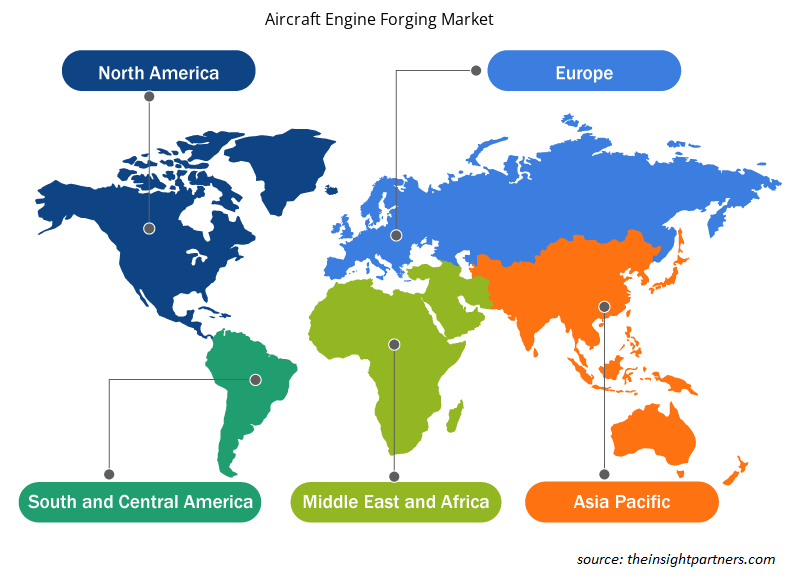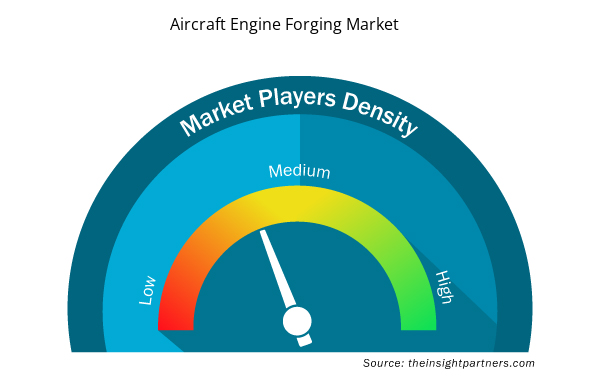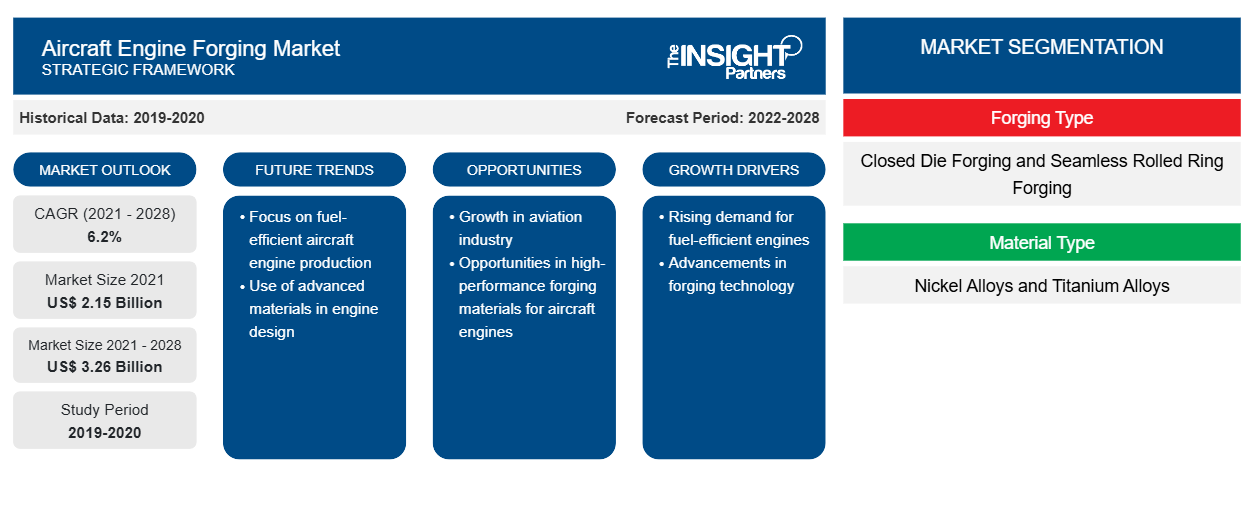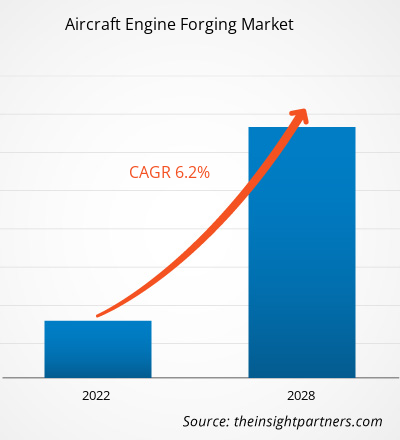预计到 2028 年,飞机发动机锻件市场规模将从 2021 年的 21.458 亿美元增至 32.6077 亿美元;预计 2021 年至 2028 年的复合年增长率为 6.2%。
根据国际航空运输协会的数据,未来二十年航空旅客数量预计将增加三倍。到 2037 年,预计航空旅客人数将达到 82 亿人次。随着客流量的增加,空客和波音等主要飞机制造商预计未来几年其商用飞机交付量将上升。因此,各国航空客流量的激增是推动航空发动机锻件市场发展的关键因素。此外,随着空中交通量的增加和下一代飞机的推出,飞机生产能力不断提高。飞机制造量的激增将进一步促进航空发动机锻造业务的发展。航空发动机部件的锻造工艺包括金属加工和机加工技术,例如闭式模锻、无缝模锻和等温锻造。
定制此报告以满足您的需求
您可以免费定制任何报告,包括本报告的部分内容、国家级分析、Excel 数据包,以及为初创企业和大学提供优惠和折扣
- 获取此报告的关键市场趋势。这个免费样品将包括数据分析,从市场趋势到估计和预测。
COVID-19 疫情对航空发动机锻件市场的影响
2020年和2021年,美国是受新冠疫情影响最为严重的国家,全国封锁和旅行限制、生产设施停工、员工短缺等因素,使美国航空发动机制造商和零部件制造商受到了冲击。疫情的大规模爆发,不仅给美国带来了健康危机,也带来了经济危机,导致航空航天业遭受重大破坏,从供应链、制造到产品销售,无一不受影响,直接和间接地影响了行业的短期和长期战略。
市场洞察 – 航空发动机锻件市场
由于早期和快速采用了技术先进的飞机发动机,北美对飞机发动机的需求有所增加。该地区蓬勃发展的航空航天和国防航空业鼓励飞机发动机制造商为各种飞机类型提供技术创新和高效的产品。北美的飞机发动机行业可能会受到这些发动机需求不断增长以及通用电气公司、霍尼韦尔国际公司、柯林斯航空航天和普惠等几家主要竞争对手的存在所推动。这些公司开展了积极的研发活动,以扩大其产品线并制造具有技术改进的系统、子系统和其他组件的飞机发动机。因此,飞机发动机行业的增长正在支持整个北美的飞机发动机锻造市场的增长。
基于材料类型的洞察
根据材料类型,飞机发动机锻造市场份额分为钛合金和镍合金。镍合金在 2020 年占据了较高的份额。许多在航空航天工业中运营的锻造公司(无论发动机还是结构部件)更倾向于使用超级镍合金。这些材料具有耐高温和耐热性能。镍合金用于燃气轮机,用于制造能量、叶片、转子、涡轮和涡轮飞机发动机、蒸汽涡轮机、推进喷嘴、工艺设备、阀门、泵和其他必须在关键环境下承受的部件。镍合金非常适合温度接近 1000 华氏度的环境。从今以后,在飞机发动机中,镍合金用于燃烧室和涡轮机。由于后半部分的温度较高,飞机发动机中使用铁基或镍基合金。在闭式和开式模锻技术中,对镍合金的需求都非常高。例如,Aubert & Duval 最近开发了 AD730。它是一种新型镍基高温合金,可承受 1,350°F 的高温,同时保持强度、抗疲劳性和蠕变性,且成本极具竞争力。
飞机发动机锻造市场根据锻造类型、材料类型、最终用户和地理位置进行细分。根据类型,飞机发动机锻造市场分为闭式模锻和无缝轧制环锻。根据材料类型,市场细分为镍合金和钛合金。根据最终用户,市场进一步细分为风扇壳体、燃烧室外壳、涡轮盘、转子等。根据地理位置,飞机发动机锻造市场规模主要细分为北美、欧洲、亚太地区 (APAC)、中东和非洲 (MEA) 以及南美和中美。All Metals & Forge Group、ATI Metals、Doncasters Group Ltd、Farinia Group、Lisi Aerospace、Otto Fuchs GmbH、Pacific Forge Incorporated 和 Precision Castparts Corp. 是研究飞机发动机锻造市场时重点关注的参与者。
航空发动机锻件市场区域洞察
Insight Partners 的分析师已详细解释了预测期内影响航空发动机锻造市场的区域趋势和因素。本节还讨论了北美、欧洲、亚太地区、中东和非洲以及南美和中美洲的航空发动机锻造市场细分和地理位置。

- 获取航空发动机锻件市场的区域具体数据
航空发动机锻件市场报告范围
| 报告属性 | 细节 |
|---|---|
| 2021 年市场规模 | 21.5亿美元 |
| 2028 年市场规模 | 32.6亿美元 |
| 全球复合年增长率(2021 - 2028) | 6.2% |
| 史料 | 2019-2020 |
| 预测期 | 2022-2028 |
| 涵盖的领域 | 按锻造类型
|
| 覆盖地区和国家 | 北美
|
| 市场领导者和主要公司简介 |
|
市场参与者密度:了解其对商业动态的影响
航空发动机锻件市场正在快速增长,这得益于最终用户需求的不断增长,这些需求源于消费者偏好的不断变化、技术进步以及对产品优势的认识不断提高等因素。随着需求的增加,企业正在扩大其产品范围,进行创新以满足消费者需求,并利用新兴趋势,从而进一步推动市场增长。
市场参与者密度是指在特定市场或行业内运营的企业或公司的分布情况。它表明在给定市场空间中,相对于其规模或总市场价值,有多少竞争对手(市场参与者)存在。
在航空发动机锻件市场运营的主要公司有:
- 全金属和锻造集团
- ATI
- 唐卡斯特集团有限公司
- 法里尼亚集团
- 利斯航天
免责声明:上面列出的公司没有按照任何特定顺序排列。

- 了解航空发动机锻造市场主要参与者概况
航空发动机锻件市场的参与者主要致力于开发先进、高效的产品。
- 2019 年,唐卡斯特出售了其在谢菲尔德、什鲁斯伯里和布莱纳文的两家业务。布莱纳文锻造公司被出售给美国私募股权公司 Arlington Capital Partners,其英国制造业务被出售给 Radius Aerospace。
- 2018 年,LISI Aerospace 在其 Forges de Bologne 工厂开发了“热模”锻造技术。这一新概念有助于保持传统锻造的生产效率,同时在微观结构均匀性和零件外部健康方面实现接近等温锻造(即在 1,250/1,300°C 下运行的锻造设备)的冶金质量。
- 历史分析(2 年)、基准年、预测(7 年)及复合年增长率
- PEST 和 SWOT 分析
- 市场规模价值/数量 - 全球、区域、国家
- 行业和竞争格局
- Excel 数据集


- Small Internal Combustion Engine Market
- Thermal Energy Storage Market
- Visualization and 3D Rendering Software Market
- Formwork System Market
- Aircraft MRO Market
- Redistribution Layer Material Market
- Micro-Surgical Robot Market
- Industrial Valves Market
- Employment Screening Services Market
- Industrial Inkjet Printers Market

Report Coverage
Revenue forecast, Company Analysis, Industry landscape, Growth factors, and Trends

Segment Covered
This text is related
to segments covered.

Regional Scope
North America, Europe, Asia Pacific, Middle East & Africa, South & Central America

Country Scope
This text is related
to country scope.
常见问题
The global aviation industry is experiencing huge demand for air travel, for both military and commercial purposes. This is leading the aircraft manufacturers to procure the latest aircraft models, and models and adopt new and robust technologies. Therefore, the production of the next generation of aircraft is expected to be one of the key trends in the aviation industry in the future. The trend is predicted to pitch over the period, leading to huge opportunities for the proliferation of aircraft component forging players
China dominated the APAC aircraft engine forging market in 2020. With a rising population in China, the adoption of air transportation is also growing. The plan of China related to the procurement of new helicopters is increased by 9%, which provides more opportunities to the engine forging companies. The aviation industry is among the top ten key areas of focus in the “Made in China 2025†initiative. To achieve this pre-determined goal, the country is heavily dependent on imported engines, avionics, and other critical components/parts. These ‘one-generation-behind’ new aircraft are projected to assist in the growth of China.
ATI Metals, Safran, Precision Castparts Corp., Arconic, and Otto Fuchs are the five key market players operating in the global aircraft engine forging market. We have derived this listing of “Key Five Players†in the global aircraft engine forging market by giving weightage to the following key parameters: overall revenue, segmental revenue, brand image & industry experience, current geotechnical construction services portfolio, customer base, geographical reach, partnerships, mergers & acquisitions, and other market-related activities.
The aircraft engine forging market is dominated by closed die forging segment which held a market share of 62.5% in 2020 and is anticipated to continue its dominance during the forecast period to account for 58.4% of the aircraft engine forging market share by 2028.
The rise in the manufacturing of aircraft is directly magnifying the demand for aircraft engines over years. Additionally, airlines, aircraft operators, armed forces, and charter operators are likely to boost the demand for new engines as part of their fleet modernization and growth plans. The growing need for a new generation of engines with low emissions and weight, which would improve airplane fuel efficiency, is also contributing to the aircraft engine forging market proliferation.
North America held the largest share of the global aircraft engine forging market. North America has experienced a rise in demand for aircraft engines due to the early and rapid adoption of technologically advanced airplane engines. The booming aerospace and defense aviation business in the region encourages aircraft engine manufacturers to provide technologically innovative and efficient products for various aircraft types. The aircraft engine industry in North America is likely to be driven by rising demand for these engines and the presence of several major competitors, including General Electric Company, Honeywell International Inc., Collins Aerospace, and Pratt & Whitney. These companies undertake vigorous R&D activities to expand their product lines and manufacture aircraft engines with technologically improved systems, subsystems, and other components. Thus, the growth of the aircraft engine industry is supporting the growth of the aircraft engine forging market across North America.
Trends and growth analysis reports related to Aerospace and Defense : READ MORE..
The List of Companies - Aircraft Engine Forging Market
- All Metals and Forge Group
- ATI
- Doncaster Group Ltd
- Farinia Group
- Lisi Aerospace
- Otto Fuchs GmbH
- Pacific Forge Incorporated
- Precision Castparts Corp.
- Safran
- VSMPO-AVISMA Corporation
The Insight Partners performs research in 4 major stages: Data Collection & Secondary Research, Primary Research, Data Analysis and Data Triangulation & Final Review.
- Data Collection and Secondary Research:
As a market research and consulting firm operating from a decade, we have published and advised several client across the globe. First step for any study will start with an assessment of currently available data and insights from existing reports. Further, historical and current market information is collected from Investor Presentations, Annual Reports, SEC Filings, etc., and other information related to company’s performance and market positioning are gathered from Paid Databases (Factiva, Hoovers, and Reuters) and various other publications available in public domain.
Several associations trade associates, technical forums, institutes, societies and organization are accessed to gain technical as well as market related insights through their publications such as research papers, blogs and press releases related to the studies are referred to get cues about the market. Further, white papers, journals, magazines, and other news articles published in last 3 years are scrutinized and analyzed to understand the current market trends.
- Primary Research:
The primarily interview analysis comprise of data obtained from industry participants interview and answers to survey questions gathered by in-house primary team.
For primary research, interviews are conducted with industry experts/CEOs/Marketing Managers/VPs/Subject Matter Experts from both demand and supply side to get a 360-degree view of the market. The primary team conducts several interviews based on the complexity of the markets to understand the various market trends and dynamics which makes research more credible and precise.
A typical research interview fulfils the following functions:
- Provides first-hand information on the market size, market trends, growth trends, competitive landscape, and outlook
- Validates and strengthens in-house secondary research findings
- Develops the analysis team’s expertise and market understanding
Primary research involves email interactions and telephone interviews for each market, category, segment, and sub-segment across geographies. The participants who typically take part in such a process include, but are not limited to:
- Industry participants: VPs, business development managers, market intelligence managers and national sales managers
- Outside experts: Valuation experts, research analysts and key opinion leaders specializing in the electronics and semiconductor industry.
Below is the breakup of our primary respondents by company, designation, and region:

Once we receive the confirmation from primary research sources or primary respondents, we finalize the base year market estimation and forecast the data as per the macroeconomic and microeconomic factors assessed during data collection.
- Data Analysis:
Once data is validated through both secondary as well as primary respondents, we finalize the market estimations by hypothesis formulation and factor analysis at regional and country level.
- Macro-Economic Factor Analysis:
We analyse macroeconomic indicators such the gross domestic product (GDP), increase in the demand for goods and services across industries, technological advancement, regional economic growth, governmental policies, the influence of COVID-19, PEST analysis, and other aspects. This analysis aids in setting benchmarks for various nations/regions and approximating market splits. Additionally, the general trend of the aforementioned components aid in determining the market's development possibilities.
- Country Level Data:
Various factors that are especially aligned to the country are taken into account to determine the market size for a certain area and country, including the presence of vendors, such as headquarters and offices, the country's GDP, demand patterns, and industry growth. To comprehend the market dynamics for the nation, a number of growth variables, inhibitors, application areas, and current market trends are researched. The aforementioned elements aid in determining the country's overall market's growth potential.
- Company Profile:
The “Table of Contents” is formulated by listing and analyzing more than 25 - 30 companies operating in the market ecosystem across geographies. However, we profile only 10 companies as a standard practice in our syndicate reports. These 10 companies comprise leading, emerging, and regional players. Nonetheless, our analysis is not restricted to the 10 listed companies, we also analyze other companies present in the market to develop a holistic view and understand the prevailing trends. The “Company Profiles” section in the report covers key facts, business description, products & services, financial information, SWOT analysis, and key developments. The financial information presented is extracted from the annual reports and official documents of the publicly listed companies. Upon collecting the information for the sections of respective companies, we verify them via various primary sources and then compile the data in respective company profiles. The company level information helps us in deriving the base number as well as in forecasting the market size.
- Developing Base Number:
Aggregation of sales statistics (2020-2022) and macro-economic factor, and other secondary and primary research insights are utilized to arrive at base number and related market shares for 2022. The data gaps are identified in this step and relevant market data is analyzed, collected from paid primary interviews or databases. On finalizing the base year market size, forecasts are developed on the basis of macro-economic, industry and market growth factors and company level analysis.
- Data Triangulation and Final Review:
The market findings and base year market size calculations are validated from supply as well as demand side. Demand side validations are based on macro-economic factor analysis and benchmarks for respective regions and countries. In case of supply side validations, revenues of major companies are estimated (in case not available) based on industry benchmark, approximate number of employees, product portfolio, and primary interviews revenues are gathered. Further revenue from target product/service segment is assessed to avoid overshooting of market statistics. In case of heavy deviations between supply and demand side values, all thes steps are repeated to achieve synchronization.
We follow an iterative model, wherein we share our research findings with Subject Matter Experts (SME’s) and Key Opinion Leaders (KOLs) until consensus view of the market is not formulated – this model negates any drastic deviation in the opinions of experts. Only validated and universally acceptable research findings are quoted in our reports.
We have important check points that we use to validate our research findings – which we call – data triangulation, where we validate the information, we generate from secondary sources with primary interviews and then we re-validate with our internal data bases and Subject matter experts. This comprehensive model enables us to deliver high quality, reliable data in shortest possible time.


 获取此报告的免费样本
获取此报告的免费样本